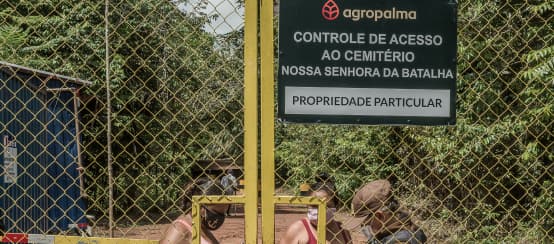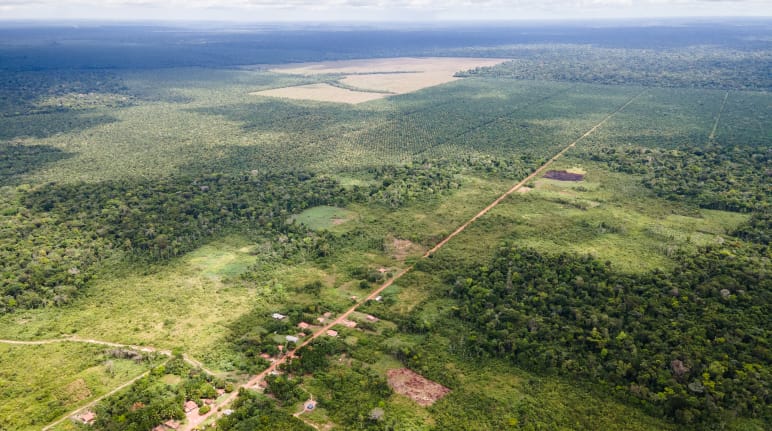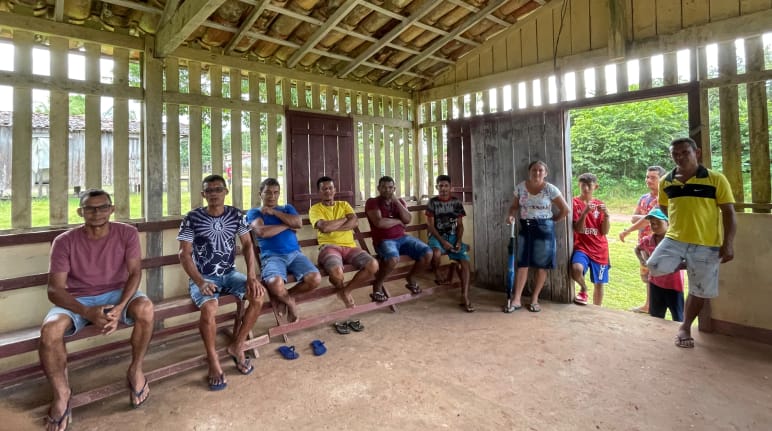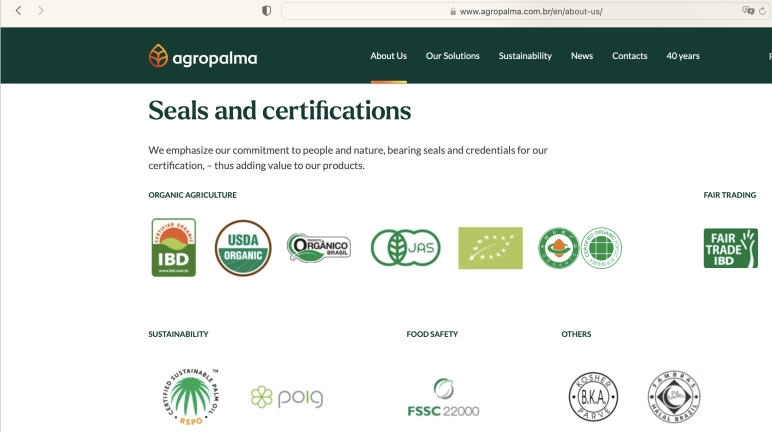Brazil: Stop land grabbing and violence for “fair and sustainable” palm oil!
Palm oil from Brazil's Agropalma sports no less than ten different seals: Certified as organic, fair and sustainable, the oil is sold to food giants such as Ferrero, Kellogg’s and Nestlé. But much of the plantation land of this purported model company was likely grabbed illegally. Local communities complain of human rights abuses.
News and updates Call to actionTo: Food manufacturers, international certifiers and seal associations, Brazilian authorities
“Put an end to label fraud! Certifiers and food manufacturers must ensure that certified palm oil is free of human rights violations.”
Agropalma, the largest palm oil producer in Brazil, is considered a global model for the industry. The group is certified with ten international seals for organic, fair and sustainable oil palm cultivation: These include the organic label of the EU (EU Organic Regulation), the U.S. Department of Agriculture (USDA Organic) and JAS from Japan, the fair trade label IBD from Brazil, as well as the Roundtable for Sustainable Palm Oil (RSPO) and Palm Oil Innovations Group (POIG) labels.
Agropalma’s palm oil customers are a Who’s Who of processed-food multinationals, including Danone, Ferrero (Nutella), Kellogg’s, Mars, Mondelez (Oreo), Nestlé, PepsiCo, Unilever (Ben & Jerry’s) and Upfield (Flora).
According to Agropalma, the 39,000 hectares of certified oil palm plantations, of which 4,000 hectares are organic, were cut into the Amazon rainforest in the state of Pará between 1982 and 2002. The group also manages 64,000 hectares of “protected forest”, in which it claims to operate climate protection (REDD+) projects.
But much of Agropalma's land apparently comes from the illegal appropriation of state-owned land, from local communities and from resident smallholders, Publica reports. In a detailed article on the palm oil company, the newspaper Ver O Fato headlined “Accused of land grabbing and with 58 thousand hectares cancelled by the courts, Agropalma is up for sale”.
Local people complain that the company resorts to violence and roadblocks and denies them access to public places such as rivers and cemeteries. Human rights organizations such as Global Witness have recorded serious human rights violations, while the Brazilian Bar Association has noted extremely poor working conditions, exploitation and severely restrictive contracts on Agropalma’s plantations.
BackgroundLand grabbing and violence against local people
Agropalma's oil palm plantations and land overlap with the ancestral lands of the communities of Balsa, Turiaçu, Vila do Gonçalves and Vila dos Palmares do Vale Acará in the Brazilian state of Pará. The villages represented in the association ARQVA (Associação dos Remanescentes de Quilombos da Comunidade da Balsa, Turiaçu, Gonçalves e Vila Palmares do Vale do Acará), which are inhabited by an Afro-Brazilian (Quilombola) majority, accuse Agropalma of having taken the land by force and with fraudulent land titles1.
“Agropalma does not respect the decisions of either the judiciary or the Ministry of Justice,” explains Quilombola leader Joaquim dos Santos Pimenta, referring to rulings of the Court of Justice of the State of Pará, which in 2018 had blocked the registration of two Agropalma plantations2: “The lands of the Roda de Fogo and Castanheira farms were sold on the basis of false documents issued by a non-existent notary’s office and by unqualified persons,” the court stated. After Agropalma appealed, the Court of Justice of the State of Pará confirmed the cancellation of the registration of the two plantations3.
Elielson Pereira da Silva of the Federal University of Pará (UFPA), who has been studying the socio-ecological evolution of communities amid oil palm monocultures since 2019, explains: “We have documented a series of violations dating back to the 1980s, when the Quilombola were evicted from their land. The territory claimed by these families is overlapped by Agropalma land on the forged land registry entries”.4
Local people accuse Agropalma of using armed security guards to block access to public areas such as the banks of the Acará River, which winds through the rainforest in countless loops, as well as properties such as cemeteries. Fishing in the river is important for local food security. The company has blocked the traditional rights of way with gates, waste containers dropped in the middle of tracks, and deep trenches.
Agropalma denies the allegations
Agropalma comments that its corporate policy prohibits actions that impede legal and regular activities of human rights defenders. However, the company claims the right to protect its employees and assets. Agropalma denies taking violent action against the named communities and individuals, and states that there are no land claims of indigenous peoples that overlap with Agropalma’s land.
Agropalma Group
The Agropalma Group is part of Alfa, a Brazilian banking group that also encompasses tourism and construction companies. According to Valor Económico reports, Agropalma is to be sold off together with other companies of the Alfa Group5.
Agropalma, which claims to be largest sustainable palm oil producer in the Americas, cleared rainforest for its oil palm plantations between 1982 and 20026. Agropalma produces certified organic palm oil on 4,015 hectares and conventional palm oil on 36,000 hectares. Roads and factories account for another 3,200 hectares, and 64,000 hectares of “protected forest” bring the total land area controlled by the group to 107,000 hectares.
In addition to the oil palm plantations, Agropalma has six palm oil mills, two palm oil refineries and an export terminal. Agropalma states that about 95% of its exports go to Europe and 5% to the United States7.
Agropalma customers
Agropalma's palm oil customers include 20 agricultural multinationals, oil mill operators and food manufacturers, such as:
- AAK8
- ADM9
- Alnatura10
- Bunge11
- Cargill12
- Danone13
- Ferrero14
- General Mills15
- Hershey16
- Kellogg Company17
- Mars18
- Mondelez19
- Nestle20
- Olenex 21
- PepsiCo22
- Pz Cussons23
- Unilever24
- Upfield25
The environmental and human rights organization Global Witness has written to the companies asking them to comment on the allegations against Agropalma. Some of the companies responded, but only made vague statements about the company’s policy and reference to the seals without addressing the allegations or indicating any concrete steps to exclude palm oil26.
About the Agropalma seals
Roundtable for Sustainable Palm Oil (RSPO)
The RSPO label covers around 5,000 companies and NGOs worldwide that claim to promote sustainable and socially responsible palm oil cultivation. Currently, the oil palm plantation area certified by the RSPO is 3.5 million hectares (2022).
According to RSPO, 107,506 hectares – i.e., 100% of Agropalma’s land – have been certified as sustainable and socially responsible under the standard since 201127. Because of the land conflicts at Agropalma, a complaint was filed with RSPO back in 2015. At the end of 2020, it was rejected by RSPO on the grounds that the land dispute was a matter for the Brazilian courts28 29 30. For its part, Agropalma had dismissed the complaints as “absurd lawsuits”31.
In early December 2022, one hundred organizations from around the world – including Rainforest Rescue – issued an open letter condemning RSPO’s greenwashing of palm oil and calling for an end to its certification32.
Palm Oil Innovations Group (POIG)
Agropalma is a founding member of the Palm Oil Innovations Group (POIG), established together with Greenpeace and WWF in 2013. POIG was created by the organizations together with a number of palm oil companies and their customers because of perceived shortcomings in the standards and performance of RSPO.
POIG currently includes three palm oil producers (Agropalma, Daabon, Musim Mas), four palm oil consumers (Danone, Ferrero, L'Oreal, Stephenson) and eight NGOs. Greenpeace has since withdrawn from the organization.
POIG claims to have the world's most stringent requirements for the cultivation and production of palm oil. According to the organization’s website, “POIG focuses on the three thematic areas of environmental responsibility, partnerships with communities including workers’ rights, and corporate and product integrity” 33.
Verification under RSPO and POIG is carried out by accredited certifiers with annual audits and field inspections. The last POIG verification report dated January 31, 2022, contained no complaints regarding Agropalma34:
“No non-conformities were verified as result of documentation analysis and interviews made with managers, coordinators, and Agropalma ́s workers, Union and Communities representative.” The report states no less than nine times: “Agropalma’s and farmers’ areas are private. There is no use of community areas for palm plantations.”
On Greenpeace's Scorecard on Palm Oil Producers, Agropalma ranks first among the companies assessed35. Agropalma also has an excellent score in the Zoological Society of London's SPOTT assessment, with 86 percentage points, including 92 percentage points for compliance with “community, land and labor rights”36.
Bio Suisse
In addition to the ten labels listed above, Agropalma's palm oil refinery Cia Refinadora da Amazonia was also certified with the Swiss Bio Suisse organic label until mid-202237. In 2021, the Swiss smallholder association Uniterre38 complained to Bio Suisse about the certification, which expired in spring 2022 and was not renewed as in previous years. In the periodical Kultur und Politik 3-22 of Bioforum Schweiz39, Laurent Vonwiller of Uniterre sees this as a result of the dialogue with Bio Suisse, which is now bearing fruit. However, Bio Suisse has stated to Rainforest Rescue that “the dialogue between Uniterre and Bio Suisse had no effect on the decision.”
According to Vonwiller, “Bio Suisse lacks the courage to acknowledge that for years, it supported an industrial agribusiness that committed wholesale property title fraud and land grabbing (with the support of RSPO!). It also lacks any signs of solidarity with the displaced communities currently fighting to reclaim the land stolen by Agropalma.”
Footnotes
1 E joio e o trigo (2022). No Pará, quilombolas são encurralados por seguranças armados e encapuzados de fornecedora da Nestlé: https://ojoioeotrigo.com.br/2022/02/Quilombolas-encurralados-por-segurancas-armados-e-encapuzados-da-agropalma-fornecedora-de-oleo-de-palma-para-nestle/
2 Ministério Público del Estado de Pará (2018). Justiça determina bloqueio de matrículas de fazendas da Agropalma: https://www2.mppa.mp.br/noticias/justica-determina-bloqueio-de-matriculas-de-fazendas-da-agropalma.htm
3 TRIBUNAL DE JUSTIÇA DO ESTADO DO PARÁ (2021). APELACÃO 0803639-54.2018.8.14.0015: http://177.125.100.71/pje/6537838
4 Pública (2022). Com inércia do governo, empresas do dendê avançam sobre terras públicas da Amazônia: https://apublica.org/2022/08/com-inercia-do-governo-empresas-do-dende-avancam-sobre-terras-publicas-da-amazonia/
5 Valor Económico (2022). Herdeiras de Aloysio Faria colocam Alfa e mais duas empresas à venda: https://valor.globo.com/financas/noticia/2022/09/16/herdeiras-de-aloysio-faria-colocam-alfa-e-mais-duas-empresas-a-venda.ghtml
6 Agropalma (2020). Agropalma Sustainability Report 2019: https://www.agropalma.com.br/wp-content/uploads/2022/02/relatorio-agroplama-2020_en_final.pdf
7 Agropalma (2020). Agropalma Sustainability Report 2019: https://www.agropalma.com.br/wp-content/uploads/2022/02/relatorio-agroplama-2020_en_final.pdf
8 AAK (2022). Updated April 2022: https://www.aak.com/contentassets/3a2ef8f179cd4c99a9e144a1fcdf62f7/aak-public-mill-list-april-2022.pdf
9 ADM (2022). List of supplying mills: https://www.adm.com/globalassets/sustainability/sustainability-reports/2022-reports/adm-mainz-2021-q1---q4.pdf
10 Allnatura (2022). Unser Beitrag für Mensch und Erde, page 28: https://kiosk.alnatura.de/alnatura-nachhaltigkeitsbericht-2021-2022/66811371
Allnatura (2022) Häufige Fragen: Palmöl: https://www.alnatura.de/de-de/magazin/palmoel-faq/
11 Bunge (2017). palm oil mill list: https://www.bunge.com/sites/default/files/mill_list.q32017.pdf
12 Cargill (2022). Cargill Global Mill List - Quarter 2, 2022: https://www.cargill.com/doc/1432132443976/cargill-palm-mill-list.pdf
13 Danone (2022). PALM OIL SUPPLIERS & MILLS LIST H2 2021: https://www.danone.com/content/dam/danone-corp/danone-com/about-us-impact/policies-and-commitments/en/2022/danone-palm-oil-suppliers-and-mills-h22021.pdf
14 Ferrero (2021). PALM OIL SUPPLIERS & MILL LISTS: https://www.ferrerosustainability.com/int/sites/ferrerosustainability_int/files/2021-12/palm-oil-suppliers-mill-list_jan-jun2021.pdf
15 General Mills (2022). List of supplying mills - January 2022: https://www.generalmills.com/-/media/Project/GMI/corporate/corporate-master/Files/Issues/General-Mills-Mill-List-H2-List-March-2022.pdf
General Mills (2022). Statement on responsible palm oil sourcing: https://www.generalmills.com/how-we-make-it/healthier-planet/sustainable-and-responsible-sourcing/palm-oil
16 Hershey (2022). July through December 2021 Palm Oil Traceability - Mill List: https://www.thehersheycompany.com/content/dam/hershey-corporate/documents/responsible-sourcing/palm-oil-sourcing/Hershey%20-%20July%20to%20December%202021%20Palm%20Mill%20List.pdf
17 Kellogg (2018). Kellogg Mill List 2018: https://betterdays.kelloggcompany.com/palm-oil ; https://filecache.mediaroom.com/mr5mr_kellogs_cr/180812/KelloggCompany_2020Milestones_PalmOil.pdf
18 Mars (2021). Mars Simplified Supply Chain Global Palm Oil Mill List:https://lighthouse.mars.com/adaptivemedia/rendition/id_c81ec933c324248719fda21219f508650bee9f08/name_out/Mars/0Simplified/0Palm/0Oil/0Mill/0List/0Feb/02021.pdf
19 Mondelez (2021). 2021 Palm Oil Mill List: https://www.mondelezinternational.com/-/media/Mondelez/Snacking-Made-Right/ESG-Topics/Palm-Oil/MDLZ-Palm-Oil-Mill-List.pdf
20 Nestle (2021). Supply Chain Disclosure Palm Oil: https://www.nestle.com/sites/default/files/2019-08/supply-chain-disclosure-palm-oil.pdf
21 Olenex Edible Oils GmbH - Brake (2021). Traceability Summary - Supplies July 2020 - June 2021: https://olenex.com/wp-content/uploads/2021/10/Europe_Q32020-Q22021_Brake_211021.pdf
22 PepsiCo (2022). PepsiCo Palm Oil Mill List 2021: https://www.pepsico.com/docs/default-source/sustainability-and-esg-topics/pepsico-palm-oil-mill-list-2021.pdf?sfvrsn=6d6ac16d_3
23 PZ Cussons (2021). PZ Cussons Palm Oil Mill List - July 2021: https://www.pzcussons.com/wp-content/uploads/2021/10/PZC-Palm-Oil-Mill-List-July-2021.pdf
24 Unilever (2021). 2020 Palm Oil Mills: https://assets.unilever.com/files/92ui5egz/production/e84d22e1c71e43033d21b63a172143c2f54595c8.pdf/unilevers-palm-oil-mill-list-declared-by-ul-suppliers-2020.pdf
25 Upfield (2021). Palm Oil Mill List for Publication: https://upfield.com/wp-content/uploads/2021/10/Mill-list-for-publication-20211008.pdf
26 Business and Human Rights Resource Center (2022). Brazil: 20 international brands named by Global Witness as major buyers of palm oil from producers linked to alleged human rights violations: https://www.business-humanrights.org/en/latest-news/brazil-20-brands-are-named-by-global-witness-as-major-buyers-of-palm-oil-from-producers-whose-activities-the-ngo-links-to-hr-violations/
27 Roundtable for Sustainable Palm Oil (2022). Agropalma - Annual Communication of Progress 2021: https://document.rspo.org/2021/Agropalma_Group_ACOP2021.pdf
28 RSPO Complaints Panel (2015). Letter to RSPO Secretariat, Aug. 13, 2015: https://ap8.salesforce.com/sfc/p/#90000000YoJi/a/90000000PY7i/icaUzhunFy61oOa_qRh2Bga9.oEOd4Mdcr.RYtH8hqE
29 RSPO Complaints Panel (2015). Letter to RSPO Secretariat, Aug. 31, 2015: https://ap8.salesforce.com/sfc/p/#90000000YoJi/a/90000000PY7Y/pUXAzZPqGlWKrkzJlY1R8IlM90.PY8Vf1maBxNd9IuU
30 RSPO Complaints Panel (2020). Re: Final decision by the Complaints Panel on the Complaint against Agropalma Group (Membership No.:1-0003-04-000-00): https://rspo.my.salesforce.com/sfc/p/#90000000YoJi/a/0o000000i0eK/nnWdyQPdKuzo1VB_MAj2Uy4TQQym.VPVmMdBP.T73gc
31 RSPO Complaints Panel (2015). Agropalma's official response to false accusations against its behalf: https://ap8.salesforce.com/sfc/p/#90000000YoJi/a/90000000PY7d/_nolTXvKwUaonrszqIXL_CbPJDXzI6NMTicNUsDd6xE
32 GRAIN (2022). Roundtable on Sustainable Palm Oil: 19 years is enough: https://grain.org/en/article/6925-roundtable-on-sustainable-palm-oil-19-years-is-enough
33 Palm Oil Innovations Group (no date). ABOUT POIG: http://poig.org
34 Palm Oil Innovation Group (2022). Palm Oil Innovation Group Verification Report For Agropalma Group In Tailândia, Acará and Tomé-Açú/Pará, Brazil: http://poig.org/wp-content/uploads/2022/04/Agropalma-POIG-Verification-Report-2021-Final-Public.pdf
35 Greenpeace (2011). Scorecard on palm oil producers: https://www.greenpeace.org/static/planet4-southeastasia-stateless/2019/04/49964559-49964559-palmoilscorecard.pdf
36 The Zoological Society of London/SPOTT (2022). Agropalma Group: https://www.spott.org/palm-oil/agropalma-group/date/november-2020/
37 International Certification Bio Suisse AG (2021). CERTIFICATE Agropalma Group / Cia Refinadora da Amazonia: https://agropalma.com.br/wp-content/uploads/2022/01/biosuisse.pdf
38 Uniterre (2022). Dialog zwischen Uniterre und Bio Suisse über die Frage des Bio Suisse Palmöls: https://web.archive.org/web/20220313035238/https://uniterre.ch/de/themen/dialog-zwischen-uniterre-und-bio-suisse-uber-die-frage-des-b
39 Bioforum Schweiz (2022) in Kultur und Politik 3-22. Dialog über Palmöl trägt erste Früchte – mehr Veränderung nötig! Ist Bio-Suisse-Palmöl nachhaltiger als konventionelles Palmöl?
To: Food manufacturers, international certifiers and seal associations, Brazilian authorities
Ladies and Gentlemen,
We call on you to withdraw the certifications granted to the Brazilian palm oil company Agropalma and to stop buying palm oil from Agropalma without delay.
Furthermore, we call on you to reform the standards of the seals, as well as the certification and monitoring process, to put an end to greenwashing and fraud related to certified palm oil.
Ensure that Agropalma’s violence and human rights violations against local communities cease immediately and that rights of way and access to public lands are fully restored and local people compensated.
We call on the Brazilian authorities to guarantee and enforce the human rights of local people impacted by Agropalma, to clarify the legal status of the company’s land once and for all, and to return illegally acquired or stolen land to the original owners.
Yours faithfully,
The issue – rainforest on our dinner tables and in our fuel tanks
At 66 million tons annually, palm oil is the most commonly produced vegetable oil. Its low world market price and properties that lend themselves to processed foods have led the food industry to use it in half of all supermarket products. Palm oil can be found in frozen pizzas, biscuits and margarine, as well as body creams, soaps, makeup, candles and detergents.
Few people realize that almost half of the palm oil imported into the EU is used as biofuel. Since 2009, the mandatory blending of biofuels into motor vehicle fuels has been a major cause of deforestation.
Oil palm plantations currently cover more than 27 million hectares of the Earth’s surface. Forests and human settlements have been destroyed and replaced by “green deserts” containing virtually no biodiversity on an area the size of New Zealand.
The impact – suffering and death in producer countries, climate havoc
The warm, humid climate of the tropics offers perfect growth conditions for oil palms. Day after day, huge tracts of rainforest in Southeast Asia, Latin America and Africa are being bulldozed or torched to make room for more plantations, releasing vast amounts of carbon into the atmosphere. As a consequence, Indonesia – the world’s largest producer of palm oil – temporarily surpassed the United States in terms of greenhouse gas emissions in 2015. With their CO2 and methane emissions, palm oil-based biofuels actually have three times the climate impact of traditional fossil fuels.
Palm oil is not only bad for the climate: As their forest habitat is cleared, endangered species such as the orangutan, Borneo elephant and Sumatran tiger are being pushed closer to extinction. Smallholders and indigenous people who have inhabited and protected the forest for generations are often brutally driven from their land. In Indonesia, more than 700 land conflicts are related to the palm oil industry. Human rights violations are everyday occurrences, even on supposedly “sustainable” and “organic” plantations.
As consumers, we are largely unaware of these broader issues, yet our daily palm oil consumption also impacts our health: refined palm oil contains large amounts of harmful fatty acid esters that are known to damage DNA and cause cancer.
The solution – a revolution on our dinner tables and in our fuel tanks
Only 70,000 orangutans still roam the forests of Southeast Asia, yet the EU’s biofuels policy is pushing them to the brink of extinction. Every new plantation on Borneo is destroying a further piece of their habitat. Stepping up the pressure on policymakers is a must if we want to save our tree-dwelling kin. Apart from that, however, there is still a lot we can do in day-to-day life.
Follow these simple tips to recognize, avoid and combat palm oil:
- Enjoy a home-cooked meal: Use your imagination: why not try almond-coconut-pear biscuits? Or pizza with potato and rosemary? A meal cooked from fresh ingredients beats processed foods containing palm oil every time. Oils such as sunflower, olive, rapeseed or flaxseed are ideal for cooking and baking.
- Read labels: As of December 2014, labeling regulations in the EU require food products to clearly indicate that they contain palm oil. However, in the case of non-food items such as cosmetics and cleaning products, a wide range of chemical names may still be used to hide the use of palm oil. A quick check of your favorite search engine will turn up palm oil-free alternatives, however.
- Remember that the customer is king: Ask your retailers for palm oil-free products. Write product manufacturers and ask them why they aren’t using domestic oils. Companies can be quite sensitive to issues that give their products a bad name, so inquiring with sales staff and contacting manufacturers can make a real difference. Public pressure and increased awareness of the problem have already prompted some producers to stop using palm oil.
- Sign petitions and write your elected representatives: Online campaigns put pressure on policymakers responsible for biofuels and palm oil imports. Have you already signed all of Rainforest Rescue’s petitions?
- Speak out: Protest marches and creative action on the street raise public and media awareness of the issue, which in turn steps up the pressure on policymakers.
- Leave your car at home: Whenever you can, walk, ride a bicycle or use public transport.
- Be informed and inform others: Big Business and governments would like us to believe that biofuels are good for the climate and that oil palm plantations are sustainable. Spread the word – share this information with your family and friends and encourage them to rethink their consumption habits. It’s in our hands!
The sustainability scam: “certified” palm oil from Brazil

International food companies such as Danone, Ferrero and Kellogg’s use the RSPO sustainability label to justify their use of palm oil. But the serious land conflicts and ongoing violence at RSPO-certified Agropalma in Brazil’s Amazon rainforest show that things are not going according to plan.
Brazil: Agropalma oil palm plantation security shoots and kills Indigenous man
There has been another violent episode in the land conflicts involving the palm oil company Agropalma in the Amazon rainforest in Pará: On November 10, an Indigenous Turiwara man was killed and at least two other people were injured by shots fired by the company’s security forces. The Indigenous people are raising serious accusations against Agropalma and the Brazilian authorities.
Brazil: Agropalma’s “certified palm oil” seals under fire
Rainforest Rescue is investigating the role of certification companies such as IBD in the fraudulent labeling of supposedly sustainable palm oil. This follows allegations of land grabbing, violence and poor working conditions in the Amazon rainforest against the certified palm oil company Agropalma.
Brazil: RSPO certification suspended for Agropalma oil palm plantations
The RSPO certification of Agropalma oil palm plantations has been suspended, Brazilian media report. The move is apparently due to serious land conflicts between the agribusiness and the authorities and local people.
The RSPO and “sustainable” palm oil: 19 years of deception is enough!
For 19 years, the RSPO palm oil label has been deceiving the public with allegedly sustainably produced palm oil. At the annual meeting of the seal association, 100 environmental and human rights organizations – including Rainforest Rescue – are calling on the palm oil industry to stop greenwashing with certified palm oil.
European Commission (no date). Aims of the organic logo https://agriculture.ec.europa.eu/farming/organic-farming/organic-logo_en
(USDA Organic)IBD (2021). Certificate of Organic Operation. Operator certified to USDA - National Organic Program: https://agropalma.com.br/wp-content/uploads/2022/01/usda.pdf
JASCERES GmbH (2021). Certificate of Compliance with Organic JAS: https://agropalma.com.br/wp-content/uploads/2022/01/jas.pdf
IBDIBD Certification (2015). Certification Confirmation for Ecosocial: https://web.archive.org/web/20190108151803/https://www.agropalma.com.br/arquivos/certificacoes/certificado_ecosocial-1439237782.pdf
(RSPO)Roundtable for Sustainable Palm Oil (2022). RSPO Annual Communication of Progress 2021:https://document.rspo.org/2021/Agropalma_Group_ACOP2021.pdf
(POIG)Palm Oil Innovation Group (2022). Palm Oil Innovation Group Verification Report For Agropalma Group In Tailândia, Acará and Tomé-Açú/Pará, Brazil: http://poig.org/wp-content/uploads/2022/04/Agropalma-POIG-Verification-Report-2021-Final-Public.pdf
PublicaPublica (2022). Com inércia do governo, empresas do dendê avançam sobre terras públicas da Amazônia: https://apublica.org/2022/08/com-inercia-do-governo-empresas-do-dende-avancam-sobre-terras-publicas-da-amazonia/
Ver O FatoVer O Fato (2022). BOMBA - Acusada de grilagem e com 58 mil hectares cancelados pela justiça, Agropalma está à venda: https://ver-o-fato.com.br/bomba-acusada-de-grilagem-e-com-58-mil-hectares-cancelados-pela-justica-agropalma-esta-a-venda/
Global Witness 2022. Brazil's biggest palm oil producers Agropalma and Brasil Biofuels accused of serious human rights violations against communities in the Pará region: https://www.globalwitness.org/en/press-releases/brazils-biggest-palm-oil-producers-agropalma-and-brasil-biofuels-human-rights-violations-para-region/
Global Witness 2022. Major international brands sourcing from Brazilian palm plantations linked to violence, torture and land fraud in the Amazon: https://www.globalwitness.org/en/campaigns/environmental-activists/amazon-palm/
Brazilian Bar AssociationOrdem dos Advogados do Brasil Seccional Pará (2015). Comissão da OAB/PA denuncia reais condições de trabalho em fazendas de cultivo de dendê no Pará: https://www.oabpa.org.br/noticias/comissao-da-oabpa-denuncia-reais-condicoes-de-trabalho-em-fazendas-de-cultivo-de-dende-no-para
This petition is also available in the following languages:
Help us reach 100,000:













